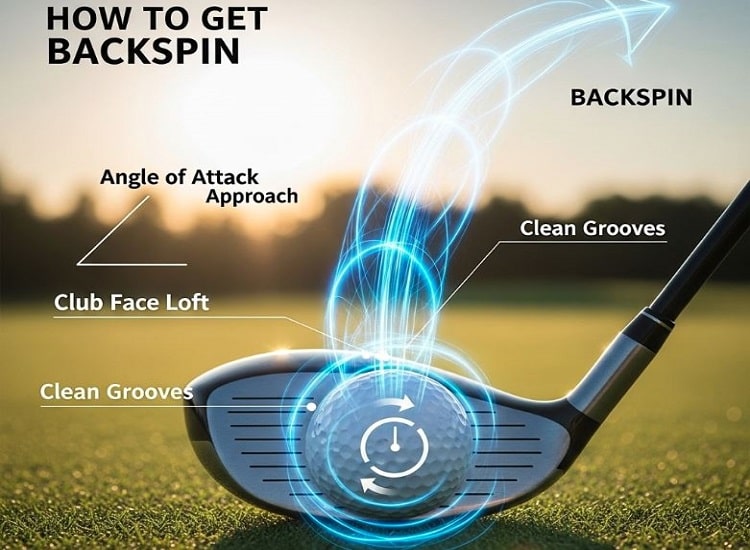Ever watched a pro golfer land the ball on the green and make it zip backward like magic? That’s the power of backspin—one of the most impressive and effective techniques in golf. But here’s the good news: you don’t have to be a tour-level player to master it.
So, how do you get backspin on a golf ball? It’s not about luck or expensive clubs—it’s about using the right combination of technique, equipment, and Golf course conditions. Whether you’re an amateur learning the ropes or a weekend golfer wanting more control on your approach shots, understanding backspin will elevate your game in ways you never imagined.

What is Backspin in Golf?
Backspin is the backward rotation of the golf ball after impact. This spin creates lift and helps the ball stop faster once it lands on the green. Backspin also adds control and precision to approach shots and wedges.
Step-by-Step: How Do You Get Backspin on a Golf Ball
In this guide, we’ll break down the exact steps you need to take—from choosing the right ball to striking the perfect shot. Let’s get spinning.
Step 1: Use the Right Equipment
Your gear matters when trying to create backspin.
- Use high-spin golf balls (like Titleist Pro V1, Callaway Chrome Soft)
- Play with clean, sharp-grooved wedges (especially 54°–60° lofted clubs)
- Choose wedges with higher loft for more lift and spin
Related Keywords: best golf ball for spin, wedges for backspin, golf spin ball
Step 2: Choose the Right Lie
The ball’s position on the ground greatly affects spin.
- Play from closely mowed fairways or tight lies
- Avoid rough or wet grass—these reduce friction and spin
- Dry, firm turf is ideal for generating spin
Step 3: Position the Ball Correctly
Ball position influences contact angle and compression.
- For short irons or wedges, place the ball middle to slightly back in your stance
- Keep your weight slightly forward for a downward strike
Step 4: Create a Clean, Crisp Strike
Strike the ball before the ground to compress it properly.
- Hit the Golf ball with a steep angle of attack
- Focus on ball-first contact, then take a shallow divot
- Avoid scooping the ball—let the loft of the club do the work
Step 5: Generate Clubhead Speed
More speed = more friction = more spin.
- Accelerate through the ball; don’t decelerate
- A full, committed swing produces more spin
- Use a shorter backswing with faster follow-through for control
Step 6: Keep the Grooves Clean
Grooves grip the ball and help create friction.
- Always wipe your clubface clean between shots
- Debris like dirt or grass reduces spin significantly
Step 7: Practice With Purpose
Consistent backspin takes practice.
- Hit 30–50 yard pitch shots to controlled targets
- Use spin-friendly balls and track your results
- Try different lies and turf conditions to adjust your technique
Bonus Tips for More Backspin
- Dry golf balls work better—moisture decreases spin
- Use a flatter swing plane and shallow divot for higher spin on short shots
- Practice on tight mats or short grass to simulate real greenside conditions
Final Thoughts
Getting backspin on a golf ball isn’t about luck—it’s about the right combination of equipment, swing mechanics, and conditions. With the steps above, you’ll be on your way to hitting those impressive spinning shots that land and zip backward like the pros.
